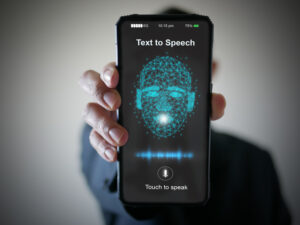The gift of speech is a miracle that speech-language pathologists help deliver every day.
Language is the basis of human communication. It’s how connections are formed, how knowledge is absorbed, how needs are made known. For most people, understanding just how important language and speaking skills can be isn’t obvious… until they are lost.
Speech therapists see that every day, though. When people of all ages lose that ability, SLP (Speech-Language Pathologists) are there to help them regain it.
Soon, they will have a new partner in that work. Artificial intelligence is coming to the world of speech pathology and therapy. See how machines will help restore the most human of abilities with new speech pathology tools.
Speech Therapy Solutions Are Running Into Demographic Challenges in America
 Compared to many parts of the healthcare world, speech-language pathology is in pretty good shape. SLP tech has grown by leaps and bounds in recent decades, offering more treatment and therapy options. Speech language therapists are well-respected and serve as valuable members of care teams. And demand for their services is strong and growing.
Compared to many parts of the healthcare world, speech-language pathology is in pretty good shape. SLP tech has grown by leaps and bounds in recent decades, offering more treatment and therapy options. Speech language therapists are well-respected and serve as valuable members of care teams. And demand for their services is strong and growing.
That in itself brings challenges in SLP, however. Like other parts of the healthcare world, speech treatment is dealing with a client base that is becoming both more diverse and often suffering from more severe disabilities. The aging US population means more stroke victims, more dementia patients, and more patients with multiple and overlapping issues to treat.
That also makes accessibility a challenge, as those patients may be less mobile. They may also be experiencing issues in many languages other than English, requiring both translation and therapy.
Not all patient groups are currently served equally, with many early-intervention programs for school kids short-staffed and forced to rely on group sessions rather than specialized individual care.
The high standards of the SLP community are coming under pressure against those sorts of demands. Artificial intelligence can help keep service up to those standards.
AI Speech Therapy Tools May Bridge the Gap in SLP Services
Artificial intelligence is the adaptation of logic and reasoning skills to computers through the use of machine learning algorithms. By applying deep learning techniques to create artificial neural networks, AI can be created to take on a number of challenging tasks that were previously only able to be accomplished by human beings:
- Understanding and responding to plain language queries with natural language use
- Viewing and interpreting imagery, both medical and visual
- Finding patterns and relationships in large amounts of unorganized data
This gives AI a rudimentary level of skill to take in information and make reasoned decisions and analysis of the world. And that can include medical and health issues such as speech afflictions.
How Will Artificial Intelligence in Speech Pathology Work?
 AI in speech language therapy doesn’t leap out at most people as a clear use of the new technology, but for speech therapists it opens up a number of new speech and language tools otherwise unavailable.
AI in speech language therapy doesn’t leap out at most people as a clear use of the new technology, but for speech therapists it opens up a number of new speech and language tools otherwise unavailable.
Automated speech recognition is the killer app for speech pathologists. While this technology has been around for a while, the unique way that AI is transforming the field is particularly useful in SLP.
The deep neural network training on vast amounts of audio material offers unique advantages to speech pathologists in the development of AI tools. The way that machine learning algorithms train themselves on a statistical basis from the information gives them a depth of comparison that is simply unmatched.
Artificial intelligence speech pathology diagnostics can quickly absorb time-consuming screening and analysis duties in schools and clinics.
Listening with an ear more refined than even the most accomplished humans diagnosticians, AI can uncover impairments and anomalies quickly and accurately. This can allow AI to assess patient speech and offer feedback along the lines of a trained SLP—directly with patients, at any time or place that is convenient for them. Some companies are already releasing AI speech therapist systems for working directly with clients.
AI may also assist speech therapists in developing more tailored treatments for specific clients. While general techniques are applied and are effective for some categories of speech deficit, every patient is ultimately unique.
An AI that can listen to and diagnose specific issues may be able to come up with highly tailored therapies designed to focus on exactly those problems with that patient. It could represent a level of fidelity that most SLPs today either couldn’t replicate on their own or simply wouldn’t have time to develop.
Speech Therapy AI Will Work Directly With Patients
 There’s every chance that AI will be able to deliver some of those therapies without the direct supervision of qualified SLPs.
There’s every chance that AI will be able to deliver some of those therapies without the direct supervision of qualified SLPs.
Instead, SLPs may work in conjunction with AI to diagnose and develop treatment plans for patients. The AI could then execute on that plan, tirelessly and consistently working through techniques and assessing progress through speech recognition.
AI-monitored diagnosis or treatment sessions could be recorded, collated, and further analyzed for more in-depth pictures of progress or additional issues over time.
AI can also develop training materials that are specific to therapy plans. Quickly putting together drills specific to fluency or speech motor therapy or whatever areas the patient needs to concentrate on, AI can free up therapists for more hands-on tasks. Many therapists are already using tools as simple as ChatGPT to generate unique passages or stories that include the target sounds for their clients.
Teletherapy technologies will also get a boost from AI. While speech language therapy delivered remotely has suffered from the lag, low-fidelity, and other limitations of digital audio transmission, AI voice therapy technology can step in to enhance and clarify what’s really happening on the other end of the microphone. It can deliver a more accurate sound pattern and give greater fidelity to therapists working with remote clients.
Assistive AI in Speech Therapy Will Step in Where Biology Won’t Cooperate
 AI is likely to come up with plenty of tools for individuals for whom no real treatment is available, as well. Assistive technologies that both comprehend and reproduce speech with unheard of fidelity are on the way.
AI is likely to come up with plenty of tools for individuals for whom no real treatment is available, as well. Assistive technologies that both comprehend and reproduce speech with unheard of fidelity are on the way.
Speech recognition software today is typically trained to recognize common accents and vocalizations. But there’s no reason that machine learning can’t be trained in impaired speech patterns instead. Just as natural language processing AI can turn English into Spanish, it may be able to turn unrecognized vocal patterns into crystal clear words.
These systems may serve as more capable text-to-speech systems that enable more fluid and seamless conversations for patients unable to vocalize. But they may also provide a trainable system that allows patients who can make consistent sounds that are tough for other people to understand. Machine learning devices can be trained to recognize their particular deficits and fill in or translate instantly.
AI speech enhancement will be a way to give voice to individuals who aren’t capable of talking on their own.
UCLA bioengineers have already developed a tiny patch that can be worn unobtrusively on the throat to help patients with dysfunctional vocal cords regain voice function. Using machine learning algorithms trained to translate larynx movements into vocalization, it has achieved a 95 percent accuracy rate.
There’s also a new niche using this technology to help clients who are still able to speak normally, but face a prognosis of total loss of speaking ability in the future. Voicebanking allows them to record their own voices in speech samples for AI systems. Using even somewhat limited libraries of those voice clips, text-to-speech (TTS) software will be able to reproduce their sounds almost exactly when they can no longer do so themselves—giving them a voice that is recognizably their own long after their own voice is gone.
Artificial Intelligence in Speech Language Therapy Will Extend Beyond Treatment
 Although it’s not as sexy as speech detection software and other innovative therapeutic uses of AI for speech therapy, one of the biggest boosts that AI will offer the SLP community in the short-term is likely on the paperwork side of the business.
Although it’s not as sexy as speech detection software and other innovative therapeutic uses of AI for speech therapy, one of the biggest boosts that AI will offer the SLP community in the short-term is likely on the paperwork side of the business.
Like any kind of healthcare provider, extensive record-keeping and documentation comes along with a job as a speech therapist. Billing, treatment, and other notes and report writing occupy a significant part of the typical clinician’s day. For those working in small clinics, they may also be handling client inquiries, scheduling, and other customer service tasks.
AI offers a way to outsource almost all of that to a machine… without missing a beat.
Just as AI speech recognition can assess patient voices during therapy, it can field phone calls and understand basic requests. Patients can book appointments, get billing questions answered, and otherwise get information about a practice without a human ever getting on the line. Naturally the same is true for website chatbots or email correspondence.
And AI can work directly with therapists, automatically taking notes on sessions, assembling patient records, and recording billing information for review. Even basic tasks like session planning can be accelerated with off-the-shelf AI chatbots today.
Artificial Intelligence in Speech Therapy Education
While most of the immediate focus on AI in SLP is on speech assessment and speech rehabilitation, some of the largest impacts in the near term may come through its impact on SLP education.
Some of the top challenges listed in 2024 by ASHA, the American Speech-Language-Hearing Association, revolve primarily around academic issues in educating professional therapists. The organization identified issues in areas like:
- Faculty workload
- Practicum scheduling difficulties
- Recruitment of qualified faculty
- Lack of alternative teaching models
AI is going to have a big impact on education in general. It’s likely that it will also have answers to many of these problems to enhance the training and recruitment of speech language therapists, as well.
For example, in the teaching model area, distance learning and simulations are both identified as among the possible needs.
Just as AI can be trained to listen and assess speech, it can generate simulated speech incorporating different impediments for training purposes. With strong natural language abilities, AI can also act as tutor and lecturer for remote students at any hour of the day. Building that kind of flexibility into online SLP studies both reduces work for human instructors and expands the reach of programs to new kinds of students.
The Ethics and Privacy Considerations of AI and Speech Therapy
 AI is already in some kind of trouble today for too-accurately reproducing voices without permission. With enough fidelity to impersonate the president of the United States, artificial intelligence is an ideal tool for scammers to use over the phone.
AI is already in some kind of trouble today for too-accurately reproducing voices without permission. With enough fidelity to impersonate the president of the United States, artificial intelligence is an ideal tool for scammers to use over the phone.
Since AI speech recognition will necessarily be collecting exactly the kind of samples that are used to build such reproductions, it’s going to a be a real concern for voice therapy that uses those tools.
That’s on top of all the other considerations that come with using AI in a healthcare setting. Appropriate disclosure to clients, watching out for built-in algorithmic bias, and guarding against inappropriate hallucinations in AI-generated materials will be important for speech therapists in the future.
SLPs will have to guard against unethical uses of the data they collect with AI tools. They will need to ensure that those tools can safeguard patient privacy both now and in the future.
The good news is that ASHA is already offering guidance on integrating AI and speech-language pathology. It even conducts a course offering continuing education credits on the subject.
Is an AI Speech Therapist the Future of SLP?
 Despite the drawbacks, speech pathology and AI add up to a future with more efficient therapists and therapy sessions. That makes for more direct time spent doing what therapists do best: interacting with and supporting patients.
Despite the drawbacks, speech pathology and AI add up to a future with more efficient therapists and therapy sessions. That makes for more direct time spent doing what therapists do best: interacting with and supporting patients.
While AI speech pathology solutions don’t represent a silver bullet in the ongoing work of helping individuals communicate better, they are a quantum leap forward for access and accessibility.
Money and initiatives to drive AI and speech pathology forward are coming quickly. A new $20 million institute at the University at Buffalo was announced in 2023 to develop AI technology to help kids with speech and language disorders.
Tasked with building an AI screening system that offers early identification of potential speech or language impairments as well as a system to tailor interventions to individual student needs, it’s just a snapshot of the kinds of developments SLP therapists are likely to see in the coming years.
Full-on AI speech therapy apps are likely, but don’t expect speech therapists to be replaced by AI any time soon. Communication remains a very human exercise. But speech therapists of the future will certainly need a strong grounding not only in the principles of speech-language pathology, but also the underlying technology of machine learning and AI.
Graduate programs teaching speech pathology today are already starting to incorporate AI-based tools into the curriculum. Students will have to pick up enough of the fundamentals to help AI engineers build the tools that the field of SLP needs.
- Emerson College - Master's in Speech-Language Pathology online - Prepare to become an SLP in as few as 20 months. No GRE required. Scholarships available.
- Arizona State University - Online - Online Bachelor of Science in Speech and Hearing Science - Designed to prepare graduates to work in behavioral health settings or transition to graduate programs in speech-language pathology and audiology.
- NYU Steinhardt - NYU Steinhardt's Master of Science in Communicative Sciences and Disorders online - ASHA-accredited. Bachelor's degree required. Graduate prepared to pursue licensure.
- Pepperdine University - Embark on a transformative professional and personal journey in the online Master of Science in Speech-Language Pathology program from Pepperdine University. Our program brings together rigorous academics, research-driven faculty teaching, and robust clinical experiences, all wrapped within our Christian mission to serve our communities and improve the lives of others.
